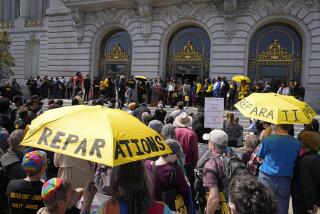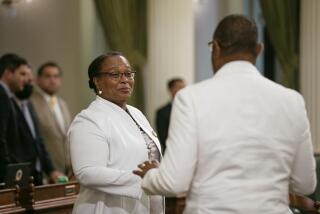Repentance Movement Seeks to Reconcile Historic Wrongs
- Share via
LAKE VIEW TERRACE — As the religiously based repentance movement gathers steam around the world, a stream of reports are pouring into a small office here that serves as the unlikely global headquarters of the International Reconciliation Coalition.
The brainchild of Baptist layman John Dawson, who lives next door to the office in a racially mixed neighborhood, the 6-year-old coalition brings together mostly Christian representatives of historically antagonistic people into reconciliation rites at which tears often flow freely.
The recent urge to repent for old, grievous sins has also swept through the rest of Christendom, taking various independent forms:
Southern Baptists 12 months ago passed a resolution lamenting the denomination’s pro-slave-owner roots and repented of lingering racism. Pope John Paul II had declared in November 1994 that Catholicism must apologize to indigenous populations for past wrongs before celebrating the start of the third Christian millennium.
The evangelical men’s movement, Promise Keepers, made racial reconciliation its clarion call this year. United Methodist convention-goers in April staged a reconciliation meeting in Colorado with Native Americans at a site where whites massacred Indians.
However, Dawson’s coordinated effort has grown rapidly into a global network of Coalition co-workers--from about 150 workers to 400 in the last year. “We’re absolutely overwhelmed,” he said.
Holding his forefinger and thumb nearly two inches apart, Dawson indicated the height of the printouts of e-mail computer messages he’s getting daily:
* White Europeans are apologizing to Muslims on intermittent prayer-walks along medieval Crusade routes over the next three years.
* White and black descendants of slave-owners and slaves plan to gather at old West African ports where once slave ships set sail for the Americas, with cargoes of humans in chains.
* In February, Australian men dressed in 18th century clothes politely escorted ashore five costumed women at Sydney Cove where on Feb. 6, 1788, more than 550 male convicts and seamen raped 188 female convicts who had just arrived by boat. As if to exorcise the lingering bad memories of that event, the Australian men and women read apologies and acceptances reflecting respect for human dignity, and celebrated the hope of pardon with Communion and hymns.
“We don’t tell people they have to do reenactments,” said Dawson. “We just tell them what other people are doing.”
But as word spreads about the unusual rites, sometimes reported in the press, “it becomes a powerful ripple. I’m amazed at the power of this thing.”
Through anecdotes and theological rationale, Dawson described his vision in a 1994 book, “Healing America’s Wounds” (Regal). The ideas gained further popularity when 2,000 copies were given away at a major evangelical gathering that year in Seoul, Korea.
Dawson, 44, admitted that recruiting for the reconciliation movement is aided by his other job as Youth With a Mission’s international director for urban missions, which has about 3,200 evangelistic and social service workers in 300 major cities.
“In some ways, I’m raiding the treasures of Youth With a Mission for the International Reconciliation Coalition,” Dawson said. At the same time, he added, “the IRC creates goodwill for YWAM.” He recently took part in a Youth With a Mission meeting in Montreal and afterward spoke to a group of pastors involved in reconciliation efforts between French Canadians and other Canadians.
The Coalition has 22 “initiatives” in progress around the world, some of them involving contemporary disputes, such as the one in Canada. Some are faraway disputes such as tensions between “Basada-speaking Javanese immigrants and the indigenous peoples of Irian Jay and Borneo,” according to excerpts from a Coalition coordinator guidebook.
Statements of Christian contrition to Muslims, lamenting the violence of the Jerusalem-bound crusaders in the Middle Ages, has received some good press. A story Jan. 1 in the English-language Saudi Gazette, sent to Dawson, was headlined, “Christians Say Sorry for Evil of Crusades!”
Dawson, a prominent figure in evangelical Christian circles, contends that Christian individuals can ameliorate bitterness that has festered for generations among subcultures and ethnic groups through what he calls “identificational repentance.”
In a coalition brochure, Dawson maintained that the greatest injustices in history were not perpetrated by individuals but institutions, philosophies, governments, religions and cultural systems.
As a result, people are tempted to absolve themselves of individual responsibility, he said.
“However, unless somebody chooses to identify themselves with corporate entities, such as the nation of our citizenship, or the subculture of our ancestors, the act of honest confession will never take place. This leaves us in a world of injury and offense in which no corporate sin is ever acknowledged, reconciliation never begins and old hatreds deepen,” he says.
Dawson outlined four steps:
* Confession: Acknowledging unjust or hurtful actions by an individual or group toward other persons or categories of persons.
* Repentance: Turning from unloving to loving actions.
* Reconciliation: Expressing and receiving forgiveness, and pursuing intimate fellowship with previous enemies.
* Restitution: Attempting to restore that which was damaged or destroyed, and seeking justice wherever the penitent has power to act or to influence those in authority to act.
Dawson contends that such actions to make amends can serve both religious and secular goals, predicting that a broadly effective reconciliation movement would “open the floodgates of revival” and heal national hatreds that have led to centuries of rancor and violence.
Supporters and skeptics alike note that it is easier to apologize for historical sins than to heal the bitter antagonisms of current disputes.
For example, the Muslim community of London, Ontario, in Canada, was upset over the ad-libbed prayers of a Pentecostal minister at an evangelistic rally who prayed for the salvation of Saudi Arabians “from the darkness and deception of the spirit of Islam.”
At a March for Jesus rally, one of thousands around the world on the weekend of May 25-26, the minister also called upon God “to give Saudi Arabia to us as an inheritance, to raise up a bold army of workers to convert the Muslim nation . . . “ The tape-recorded remarks were reported in the local paper.
The minister, the Rev. Miguel Sanchez, apologized in writing “for the hurt and pain caused to the Muslim community,” but after first accepting the apology, Muslim leaders decided to hold a “march of tolerance” June 1 and asked Sanchez to give his apology before the crowd.
At the urging of associates familiar with Dawson’s reconciliation network and his past work with March for Jesus rallies, Sanchez telephoned the Californian for advice.
“I told him about the movement and recommended that he apologize in front of them,” Dawson said.
Although, in the end, Sanchez backed out of an appearance at the rally, political and Christian leaders of the Canadian city joined in the Muslim march. “The atmosphere was like a family reunion,” said local Christian leader Eugene Fox.
More to Read
Sign up for Essential California
The most important California stories and recommendations in your inbox every morning.
You may occasionally receive promotional content from the Los Angeles Times.













